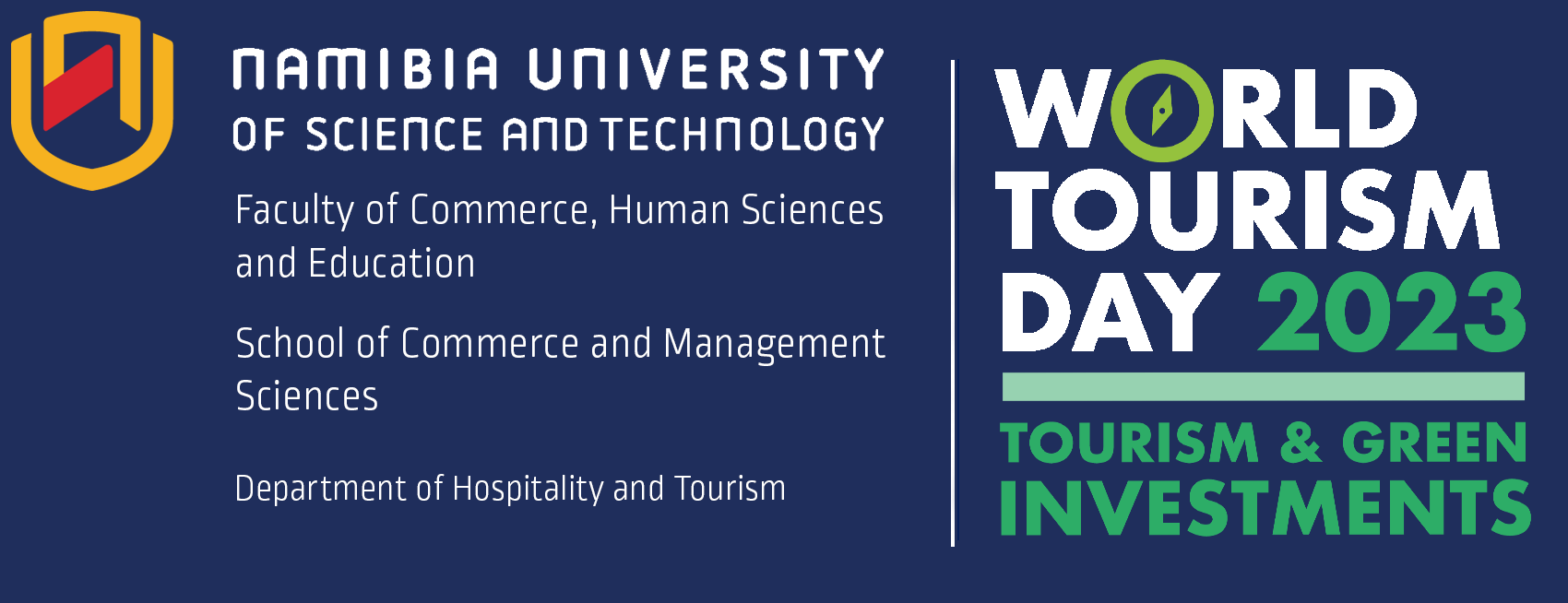About WTD at NUST
The COVID-19 pandemic has significantly disrupted the tourism industry, offering an opportunity to redefine and adjust tourism investments in line with the Agenda 2030 and Sustainable Development Goals. UNWTO has recognized the importance of investments in the recovery and growth of tourism, aiming to align them with people's well-being, environmental sustainability, and economic prosperity.
UNWTO emphasizes the necessity for targeted investments, both traditional and non-traditional, to benefit individuals, the environment, and overall prosperity. These investments are seen as a means to unlock tourism's potential to create opportunities, enhance resilience, promote climate action, and achieve sustainability.
UNWTO has placed investments at the forefront of its priorities, acting as a link between Member States, destinations, businesses, and investors. This initiative will culminate in World Tourism Day 2023, rallying the international community, governments, financial institutions, development partners, and private investors around a new approach to tourism investments.
The global celebration of tourism will underscore the crucial requirement for investments that support People (through education and skills), Planet (via sustainable infrastructure and eco-friendly transformation), and Prosperity (by fostering innovation, technology, and entrepreneurship).

Prioritizing Education and Upscaling Skills
“Education is a fundamental human right. It’s the bedrock of societies, economies, and every person’s potential. But without adequate investment, this potential will wither on the vine” - Secretary-General of the UN, on the occasion of the International day of Education (2023).
The crisis has highlighted the necessity to reevaluate the structure of tourism economies for enhanced competitiveness, resilience, and the acceleration of SDG 4 (quality education) implementation. In this context, the sector should prioritize investments in education and skill development across all domains, including women, to foster valuable jobs and resilience. A sustainable tourism industry necessitates the right talent.
Tourism stands as a significant global employer, employing one in every ten individuals worldwide in 2019. It serves as a catalyst for economic diversification and generates employment with a far-reaching impact on sectors contributing to rural development. Particularly in rural settings, tourism can empower marginalized groups like women, constituting 54% of the sector's workforce compared to 39% in the broader economy, as well as youth and Indigenous communities. The sector is also a gateway for micro and small businesses, including self-employed individuals, forming a substantial part of both the tourism sector and community-level entrepreneurship.
However, in emerging destinations, half of the youth lack access to tourism opportunities due to limited resources, opportunities, or educational access. Moreover, the current education and training landscape is imbalanced, disproportionately emphasizing hotel management. Looking forward, the global tourism workforce will require millions of hospitality graduates annually until 2030, along with an additional 800,000 jobs necessitating specialized vocational training each year.
Given these factors, investing in people is essential as they form the bedrock of tourism. This underpins UNWTO's commitment to empower individuals and infuse investments into forthcoming endeavors.
Image by Freepik

Supporting Tourism’s green transition
Ensuring the tourism sector fulfills its role in addressing the climate crisis is imperative, as outlined in the Global Risk Report 2023 by the World Economic Forum, which identifies it as a major concern over the next decade.
The imperative for a greener tourism sector is clear, not only for the environment but also to enhance competitiveness, resilience, and align with the green objectives of the Agenda 2030 and SDGs. Green investments and innovation must drive this transformation, with particular emphasis on the vital role of hotel investments, which have surged significantly, especially in eco-friendly structures, resulting in increased global hotel investment volume in 2021.
Looking ahead, the potential to invest $24.7 trillion in reducing emissions by 2030 within the green buildings sector of emerging markets presents an opportunity, with hotels, resorts, and restaurants accounting for a substantial portion. Beyond emissions, there are diverse investment prospects for decarbonizing tourism and establishing climate-resilient infrastructure. Capitalizing on these opportunities will address the $4 trillion annual investment gap required for achieving Sustainable Development Goals in developing countries.
Consequently, a revision of current frameworks and approaches to tourism investment is essential for expediting the sector's transition towards sustainability. The pandemic has offered a window to forge global and regional partnerships, formulate green investment frameworks, and introduce innovative financial initiatives to support the commitment of halving emissions by 2030 and attaining Net Zero before 2050.

Fostering Innovation and Entrepreneurship
Prioritizing digitalization and innovation initiatives is a strategic focus, particularly to empower young individuals and women, crucial for enhancing the tourism workforce's skills. Additionally, there's a global imperative to augment investments in programs promoting entrepreneurship and innovation within the tourism sector.
Empowering women holds significant importance in fostering fair and equitable societies. Tourism serves as a pathway to empowerment, and its potential impact should be maximized. According to the UNWTO's Global Report on Women in Tourism Second Edition, women comprise 54% of the tourism workforce, compared to 39% in the broader economy. Therefore, greater emphasis on supporting female entrepreneurs is essential. World leaders should take immediate, resolute action to invest in policies that ensure better job opportunities and equal pay for women. Female entrepreneurship is a driving force for economic growth and poverty reduction, yet its full potential remains untapped. Investing in women entrepreneurs is synonymous with investing in transformation, as they bring innovation, competitiveness, and fresh perspectives to the table.
Hence, investments in innovation and digitalization, with their cross-sectoral influence, possess a multiplier effect. They strengthen significant global and regional projects, stimulate tourism recovery, safeguard employment by supporting micro, small, and medium-sized enterprises (MSMEs), counteract economic systemic impact, sustain jobs, and establish conditions for post-pandemic growth.
Image by Freepik

